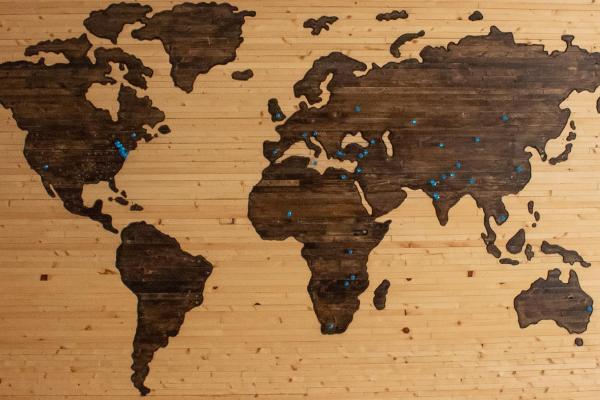
Presented by the OIA Area Studies Centers:
2024-2025 K-14 Global Fellowship Program
"Indigenous Peoples Across the Globe"
September 21, 2024
9:00am - 12:00pm Eastern Time (online)
The Ainu, the Indigenous People of Japan
Dr. Kinko Ito, University of Arkansas at Little Rock
Dr. Ito's presentation will introduce the audience to the modern history and culture of the Ainu with special attention to the relationships between the indigenous people and the Japanese government. Their ancestors used to live in the southern Sakhalin, the Kuril Islands, Hokkaido, and the northern part of Honshu. Today, they live mainly in Hokkaido and the Tokyo metropolitan areas. The history of the Ainu is a history of exploitation and oppression as well as inequality, prejudice, and discrimination by the Wajin (non-Ainu Japanese). The assimilation policies of the Japanese government in the 19th century were basically a process of ethnic cleansing, and they still have much implication in contemporary Japan. The Ainu live just like anyone else, but some encounter certain problems in their everyday life. The topics above will be explored with time for a Q & A session.
To register for the Sept. 21 only program, please register here.
Current Schedule
- September 7, 2024, 10:00-12:00 PM EST: Pre-program orientation and networking session
- September 21, 2024, 9:00AM-12:00 PM EST: Regional Topic Session on East Asia with Dr. Kinko Ito (U. of Arkansas at Little Rock)
- October 12, 2024, 9:00AM-12:00 PM EST: Regional topic Session on Eastern Europe and Eurasia with Dr. Dima Arzyutov (Ohio State U.)
- January 25, 2025, 9:00AM-12:00 PM EST: Regional Topic Session on Africa with Dr. Jacien Carr (Ohio State U.)
- February 15, 2025, 9:00AM-12:00 PM EST: Regional Topic Session on Latin American with Dr. Mintzi Martinez-Rivera (Ohio State U.)
- March 8, 2025, 9:00AM-12:00 PM EST: Regional Topic Session on the Middle East with Dr. Nathalie Peutz (New York U. Abu Dhabi)
- April 12, 2025, 9:00AM-12:00 PM EST: Pedagogy Session with Dr. Daniel Redman (Ohio State U.)
Cohort Application deadline: August 30, 2024 (closed)
This year’s Global Fellowship Program will focus on Indigenous peoples across the globe. Participating educators will explore the histories and challenges faced by Indigenous groups in Africa, East Asia, Eastern Europe and Eurasia, Latin America, and the Middle East. Regional topic sessions will help to expand teachers’ and students’ knowledge about Indigenous peoples outside of North America, their histories and cultures, their interactions with others, and the issues they face in their respective regions. By attending this program, participants will receive historical background and resources on this topic so that they can teach and discuss this subject with their students in their own classrooms.
Format
This program will consist of one pre-program orientation in early September, 4-5 regional topic lectures during October through March, and one pedagogy session in April. Sessions will take place on select Saturdays during the academic year from 9:00 a.m.-12:00 p.m. EST online via Zoom. The program dates will be released in August 2024.
Eligibility
The 2024-25 program is FREE, virtual, and open to pre- and in-service K-12 educators, community college educators, and K-14 administrators. This year's cohort size will be limited to 30 participants.
Requirements
Participants are expected to attend all sessions in order to receive CEUs/contact hours. Any missed sessions without prior notice will result in a reduction of CEUs/contact hours.
Benefits
Teachers who participate in the program receive:
- Curricular resources
- Pedagogical support
- Continuing Education Units
Accessibility Accommodations
If you have any questions about accessibility or wish to request accommodations, please contact contact Alicia Baca (baca.31@osu.edu). Typically, a two weeks' notice will allow us to provide access.
Education Standards
The 2024-25 Global Fellowship Program will be covering the following Ohio learning standards. This section will be updated as the regional subtopic sessions are finalized.
Educators from ALL states, backgrounds, and disciplines are welcome in this program as multiple perspectives help us to see and learn about the world around us in different ways. This list only aims to compile learning standards in our state that will be covered throughout.
This program is organized by the Center for Slavic, East European and Eurasian Studies in partnership with the Center for African Studies, the Center for Latin American Studies, the East Asian Studies Center, and the Middle East Studies Center.
